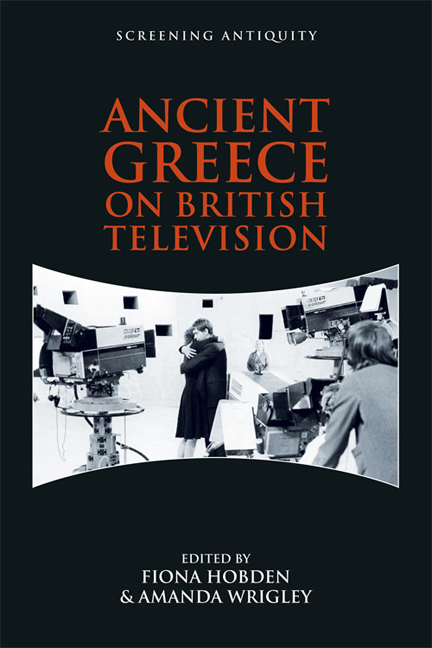Book contents
- Frontmatter
- Contents
- List of Figures and Tables
- Series Editors’ Preface
- Acknowledgements
- Contributors
- Abbreviations
- Broadcasting Greece: An Introduction to Greek Antiquity on the Small Screen
- 1 Are We the Greeks? Understanding Antiquity and Ourselves in Television Documentaries
- 2 Louis MacNeice and ‘The Paragons of Hellas’: Ancient Greece as Radio Propaganda
- 3 The Beginnings of Civilisation: Television Travels to Greece with Mortimer Wheeler and Compton Mackenzie
- 4 Tragedy for Teens: Ancient Greek Tragedy on BBC and ITV Schools Television in the 1960s
- 5 The Serpent Son (1979): A Science Fiction Aesthetic?
- 6 Don Taylor, the ‘Old-Fashioned Populist’? The Theban Plays (1986) and Iphigenia at Aulis (1990): Production Choices and Audience Responses
- 7 The Odyssey in the ‘Broom Cupboard’: Ulysses 31 and Odysseus: The Greatest Hero of Them All on Children’s BBC, 1985–1986
- 8 Greek Myth in the Whoniverse
- 9 The Digital Aesthetic in ‘Atlantis: The Evidence’ (2010)
- 10 Greece in the Making: From Intention to Practicalities in Television Documentaries. A Conversation with Michael Scott and David Wilson
- Bibliography
- Index
7 - The Odyssey in the ‘Broom Cupboard’: Ulysses 31 and Odysseus: The Greatest Hero of Them All on Children’s BBC, 1985–1986
Published online by Cambridge University Press: 24 April 2021
- Frontmatter
- Contents
- List of Figures and Tables
- Series Editors’ Preface
- Acknowledgements
- Contributors
- Abbreviations
- Broadcasting Greece: An Introduction to Greek Antiquity on the Small Screen
- 1 Are We the Greeks? Understanding Antiquity and Ourselves in Television Documentaries
- 2 Louis MacNeice and ‘The Paragons of Hellas’: Ancient Greece as Radio Propaganda
- 3 The Beginnings of Civilisation: Television Travels to Greece with Mortimer Wheeler and Compton Mackenzie
- 4 Tragedy for Teens: Ancient Greek Tragedy on BBC and ITV Schools Television in the 1960s
- 5 The Serpent Son (1979): A Science Fiction Aesthetic?
- 6 Don Taylor, the ‘Old-Fashioned Populist’? The Theban Plays (1986) and Iphigenia at Aulis (1990): Production Choices and Audience Responses
- 7 The Odyssey in the ‘Broom Cupboard’: Ulysses 31 and Odysseus: The Greatest Hero of Them All on Children’s BBC, 1985–1986
- 8 Greek Myth in the Whoniverse
- 9 The Digital Aesthetic in ‘Atlantis: The Evidence’ (2010)
- 10 Greece in the Making: From Intention to Practicalities in Television Documentaries. A Conversation with Michael Scott and David Wilson
- Bibliography
- Index
Summary
This chapter explores two television programmes, Ulysses 31 and Odysseus: The Greatest Hero of Them All (hereafter Odysseus), for the ways that each retells the myths about Odysseus, with their origins in Homer, for a television audience of children in the 1980s. These two television series merit discussion because they offer individual responses to the myths that were contemporary with one another and aimed directly at children. Ulysses 31 was a Franco-Japanese production and animation, while Odysseus was a live-action, story-to-camera BBC production. Both programmes were initially transmitted in the UK (1985–6) as part of the BBC's newly created Children's BBC on BBC1, and each reconfigured the hero Odysseus and his myths by drawing on different aspects of 1970s and 1980s film and television culture in order to contemporise the classical material. The chapter shows how this was achieved through a combination of innovative storytelling techniques and creative use of the mode of television and televisual animation coupled with a detailed knowledge of the myths of Odysseus. Moreover, these two programmes provide contemporary examples of localised (British) and international (Franco- Japanese) production contexts so that it is possible to compare how these local and international contexts shaped the format and creativity of each programme. Ultimately this study highlights the way that Ulysses 31 drew on popular film culture and Japanese techniques in animation, framing Odysseus’ heroism via cinematic appeal in order to make the stories of Odysseus resonate with new audiences, whereas Odysseus adapted the BBC's Jackanory story-to-camera format and so constructed an anglified Odysseus that contemporised the character and his setting for British audiences of the 1980s while still evoking the wit and wiles of the Homeric Odysseus.
For viewers in the UK both programmes were seen within the same transmission context when they first aired on Children's BBC, 1985–6. Therefore, although the genre and mode of production are points of divergence between the two programmes, they do share a context of transmission at the very start of the BBC's new programming format, Children's BBC, created by Pat Hubbard, Head of Presentation at the BBC in 1985.
- Type
- Chapter
- Information
- Ancient Greece on British Television , pp. 147 - 167Publisher: Edinburgh University PressPrint publication year: 2018



